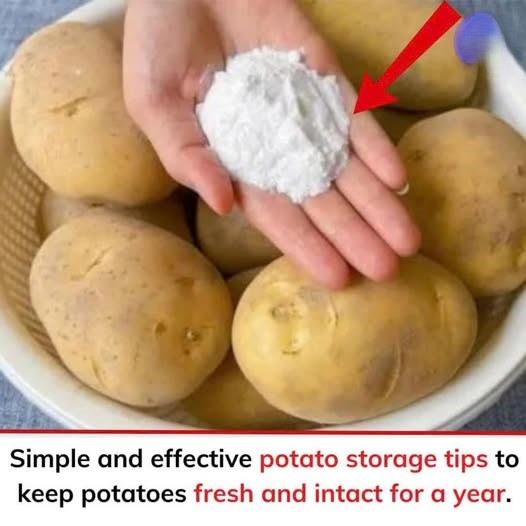ADVERTISEMENT
Simple and Effective Potato Storage Tips to Keep Potatoes Fresh and Intact for a Year
Potatoes are a versatile and essential ingredient in many kitchens. Whether you’re roasting, mashing, or frying, there’s no denying the importance of this humble tuber in everyday cooking. But if you’ve ever found yourself with a large batch of potatoes and wondered how to store them for the long haul, you’re not alone. The key to preserving potatoes for months—even up to a year—lies in how you store them.
In this article, we’ll share simple yet effective tips to keep your potatoes fresh and intact for an extended period, ensuring that you always have this kitchen staple on hand when you need it.
1. Choose the Right Potatoes
It all starts with the right kind of potato. When planning to store potatoes for a long period, make sure you’re using fresh, unblemished potatoes. Look for potatoes that are free of bruises, cuts, or signs of sprouting. The best types for long-term storage are Russet potatoes and other starchy varieties, but you can also store Yukon Gold or Red potatoes for a while with proper care.
Avoid storing potatoes that are already showing signs of damage or sprouting, as these will spoil faster.
2. Keep Potatoes in a Cool, Dark Place
Light and warmth are two things that cause potatoes to spoil quickly. For the best storage, place your potatoes in a cool, dark environment—the ideal temperature is 45°F to 50°F (7°C to 10°C). If your kitchen is warm, consider storing them in a cellar, basement, or a pantry that doesn’t get too hot during the summer months.
Avoid storing potatoes in the fridge, as the cold temperature can turn the starches into sugars, leading to a weird flavor and texture.
3. Use a Well-Ventilated Container
Air circulation is essential for keeping potatoes fresh. You want to store them in a container that allows air to circulate, preventing excess moisture and mold growth. The best containers for this purpose are ventilated bins, wooden crates, or paper bags. Avoid plastic bags, as they trap moisture and can cause potatoes to rot faster.
If you’re using a basket or crate, make sure there’s enough space between the potatoes so they’re not crowded together. The air needs to flow freely around them to keep them fresh.
4. Do Not Wash Before Storing
While it may seem tempting to clean your potatoes before storage, washing them is a big mistake. Moisture encourages mold and rot, so it’s better to leave potatoes unwashed until you’re ready to use them. If your potatoes are particularly dirty, just brush off any loose dirt using your hands or a soft brush. This way, they stay dry and can be stored for much longer.
5. Separate Damaged Potatoes
Before storing your potatoes, inspect them carefully for any damaged or bruised potatoes. Any potatoes with spots, cuts, or bruises should be removed immediately to prevent them from contaminating the others. Even one bad potato can cause the entire batch to spoil faster.
If you do find a sprouting potato, don’t worry! You can cut off the sprouts and still use the potato, or you can plant it if you’re feeling adventurous and want to grow your own potatoes!
6. Keep Potatoes Away from Onions
Onions and potatoes are often stored together, but this is actually not a good idea for long-term storage. Onions release gases that can cause potatoes to spoil faster, and vice versa. To maximize shelf life, keep them separate in your pantry or storage area.
7. Monitor Your Potatoes Regularly
Even though potatoes can last for several months when stored properly, it’s important to check on them regularly. Every few weeks, go through your batch and inspect each potato for any signs of spoilage, such as sprouting, soft spots, or mold. If you notice any, remove the affected potato to keep it from affecting the rest of the batch.
